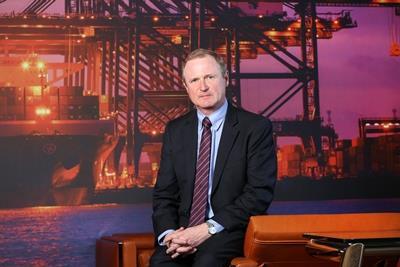
The interview with Maritime Transport Group MD John Williams takes place in the company’s impressive new head office overlooking the port of Felixstowe in Suffolk. The four-storey building is lavishly appointed with marble and granite everywhere – even in the drivers’ luxurious shower room – but Williams is quick to point out that despite appearances everything was built to a budget.
“When we started builders were desperate for work so we got a very good fixed-price deal,” he says. “We went out and sourced all the marble and granite ourselves in China so we got a good price on that too.”
That approach is not too surprising – any company that not only survives but thrives in the cut-throat world of container haulage must keep a Scrooge-like eye on costs.
Williams, his marketing director Andrew McNab and financial director Alan McNicol worked together for more than 20 years at Russell Davis, Securicor and DHL, and in 2001 they put together a deal to acquire Maritime.
“I’ve been very close to them over the last 20 years, so we knew each other really, really well,” says Williams. “We knew what we were good at and we just got on with it.”
Industry experience
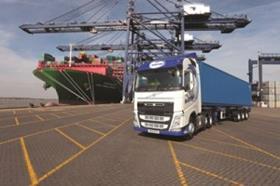
He goes on: “I had this burning ambition to be my own boss, specifically to own a transport company, because that’s really all I know. Apart from working here at the port for three years, and Securicor and DHL for five years, container transport is what I know.
“I wanted to get back to that, and so this opportunity came along to buy this transport company called Maritime Haulage, and I succeeded in buying it on 4 September 2001.”
At the time it had 136 trucks and turned over £18m – “but I don’t think it was making any money”.
“All the trucks needed replacing. There were just five depots, and it was probably fifth or sixth in terms of container transport,” says Williams. “It was in poor shape, and a week later we had the appalling attack in New York. We were out seeing customers and we were in a pub in Liverpool. There were six or seven of us, watching this whole, dreadful event, and I thought ‘I’m 43 years old, I’ve just mortgaged my house to provide the security to buy Maritime Haulage’. I don’t think I slept that night.”
Despite Williams’ fears of “World War 3” breaking out, the years after the terrorist attacks on New York and London were actually very good. “The following seven years were a period of extraordinary growth,” says Williams. “We had compound growth from the volumes coming in. The big retailers were going to Asia to source their products. The ships were full, the ports were even fuller, and it was a very strong time for us being an independent, privately-owned transport company with a lot of vigour.
“We were really, really motivated. We had much more enthusiasm than the other operators at the time, and they were very fearful of us, and quite rightly so. With the growth, we were reinvesting everything and we became cash-positive and debt-free very quickly. We then bought all our trucks, we bought all our trailers and tried to buy land where we could operate from. What we didn’t want to do was buy a villa in Portugal and detract from what was, and still is, a really enjoyable period of running our own transport company because we waited so long to get there.”
But in 2008, the debt-fuelled bubble finally burst and the world went into the deepest recession in living memory.
The perfect storm
“Once the money’s gone, there’s nothing you can do to put it back in the system,” says Williams. “We were very fearful of the recession, because what we actually had as a container transport company was a perfect storm. Not only was the global economy on its arse, but our customers, who had benefited from the compound growth, had all decided to buy bigger ships, and more of them. These ships take three to five years to deliver so they arrived just at the same time that the world was falling apart.
“Overnight they created a surplus of capacity of something like about 30%. Their breakeven point has got to be 85% to 90% full, so with a 30% increase in capacity they were losing billions. When your customers are having a bad time, you can be sure you’re going to have them as well.”
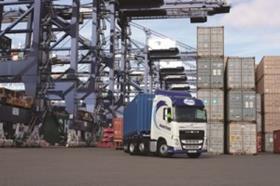
By 2009, Maritime had grown to a £69.3m annual turnover, without making any acquisitions – but that was about to change.
“Like us, all our competitors were getting seriously bashed up, and this brought two spectacular opportunities,” says Williams. “DHL decided to withdraw from the container transport market. We were the only people with the capability – and the courage – to acquire it because the market was still rough.”
The 2010 DHL acquisition was primarily property led.
“It gave us a solution to a big problem that we had at Maritime,” explains Williams. “We didn’t have a depot in the north, and the acquisition gave us six acres of freehold next to Old Trafford. And here, we were soon to be evicted from our site, because the depot was being reclaimed, and quite possibly we would have ended up in three or four different locations.
“It gave us the 17 acres that you see here. We’ve got 10 here, and seven on the other side of the road. It was opportunist, it was property led, and it solved a specific problem in Maritime. It was a no-brainer, and we were really pleased to be able to do the deal.”
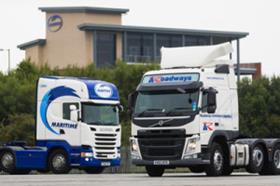
DHL was followed by last year’s acquisition of Roadways, which was “property-led and opportunistic”, reinforcing Maritime’s position as the UK’s largest container haulier and completing its UK network of 23 depots.
“The Roadways acquisition gave us 27 acres in Leeds, another 12 acres in Trafford Park, a 22-acre rail terminal in Birmingham and 9 acres in Nursling near Southampton, on the A271, which is absolutely perfect for us,” says Williams. “That’s given us a footprint of more than 150 acres of concreted, prime location depots in the UK. We have invested more than £100m in our company, and I don’t think you can point at any other company who has done anything like it.” The opportunity arose because conditions in container haulage have remained “very challenging”.
“Only a few shipping lines are making money, so getting rate increases is really difficult,” says Williams. “We’ve got a chronic driver shortage and we’re plagued with low productivity in the container transport industry.”
Container haulage is so difficult to make money from because the process of loading at the port and unloading at the customer delivery point means utilisation of vehicles is very low.
High break-even point
“There are a lot of breaks in the supply chain,” says Williams. “It’s serviced by one driver, one truck, doing 1,500 miles a week. The break-even point of something like that is very high. With large port-based fleets, you can get winded off [prevented from unloading container ships due to bad weather]. There’s no activity on bank holidays, and very little at weekends.
“Container transport has always been seen as a really hard place to succeed, and this is why. It’s become more complex, because the ports have now introduced what they call a vehicle booking system. What that really means is that they have prioritised the efficiency of their resources to manage increasing container volumes.”
As a result, container trucks can have fixed time slots for both loading and unloading, with no opportunity to use the vehicle on other work if these two slots are badly aligned.
“We’re in between, and we’ve got to try and keep the fleet productive, so the pressure is really all on us,” says Williams. “A pure container transport company, operating on the old model, would become extinct pretty quick.
“So in 2010, as a private company, we decided to break into distribution with curtainsiders. Tesco gave us our first opportunity, and we took it with both hands.
“We learned so much about utilisation, double-shifting, weekend working, Bank Holiday working and cross-utilising container trucks and distribution trucks and equipment. I think we were one of the few companies that have been able to pull this off on the scale that we’re doing it.

“I hate to use the word ‘game-changer’; it’s over-used, but it certainly was for us.”
Distribution now represents about 35% of Maritime’s turnover, and is still growing. To make this strategy work requires a large enough fleet to service the major retailers.
“You have to have scale,” affirms Williams. “You can’t offer a customer three loads on a Bank Holiday Monday. If they want 33 done, and you can do those 33, you can solve their problem.
“We are the largest transport partner in the UK for a number of retailers, and if they’re running a campaign or they’ve got a big promotion on, you can’t say ‘no’. You’ve got to do it, and therefore you’ve got to have the resource.”
But there are uncertainties inherent in container haulage, with the vagaries of when ships arrive in port – and with container ships getting larger the peaks in workload for hauliers are getting bigger and further apart. This makes it difficult to plan the availability of tractor units employed on port-based container work.
Growing inland
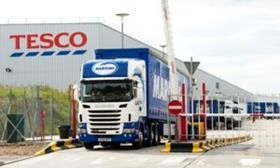
“We’ve grown a lot inland, and Northampton is a big operation for us,” says Williams. “Also Milton Keynes, Reading and Doncaster – this is where we service the distribution customers. It’s quite easy for them to switch on to containers, so one day they could be going to Felixstowe, to Southampton, to Tilbury, or to London Gateway. It also has had the benefit of widening our ability to recruit drivers.
“If we were just here competing in Felixstowe with everybody else, we would exhaust the supply of drivers. We can grow more inland. Large port-based fleets are still vital to us, but the others are just as important, and probably represent more opportunities in the future.”
Maritime’s inland locations also include off-dock storage facilities, allowing it to smooth the flow of containers to their ultimate destinations.
“We can take containers inland and position them very close to their final destination, so we’re now starting to be in control of the process of the final miles delivery,” says Williams. “When you have a situation when ports are starting to get congested or winded off we can start to plan ahead and utilise those facilities.”
As things stand, Williams does not believe a ‘pure play’ container haulier could make money.
“It’s going to get to the point where it’s not viable unless customers take matters into their own hands by awarding generous rate increases to cover the downtime. I don’t think that they will,” he says. “Ultimately, unless things change, no, I don’t see it. You’ve got to complement it, you’ve got to get scale, and you’ve got to get your productivity up. You’ve got to do other things.”
REINVESTING INSTEAD OF SPENDING THE PROFITS
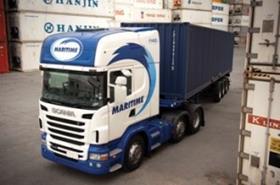
At the time of our interview, Maritime was just about to release its 2014 financial results, which were expected to show a turnover of £195m and a pre-tax profit of £3m.
Williams’ policy is to reinvest profits in the business rather than take them out and use debt to fund assets.
“A lot of my competitors, over the years, as soon as they can they take the money out, they rent land, they lease trucks and they borrow money to run their businesses. That’s not a recipe for success. It’s a recipe for disaster. We did it completely the other way, in terms of make as much money as we can, and reinvest the vast majority of it directly into the business. Our land isn’t owned by some secret pension fund in Geneva, it’s owned by the company and is used by the company. There’s no smoke and mirrors going on.
“We want to do is make the company absolutely bombproof. There are eight of us who run this business and we all work exceptionally hard. We’re devoted to it, but we’ve got another generation coming through, and it may well be that they are the ones who benefit from all the sacrifices we’ve made. I tell you, if my sons sell the business three months after I’ve given it to them, there’ll be hell to pay. There won’t be any Christmas dinners at our house!”
Maritime has been described as a very successful used truck dealer that also happens to do haulage and distribution, and Williams admits that the container market remains tough.
“The distribution produces the best margin, because it has the greatest level of productivity,” he says. “With the container business, we’re still in difficult territory, because our customers are still losing money. Over the last five years we have given more back than we’ve received. We are really hoping that the day comes, in the not too distant future, that the shipping lines all return to prosperity, and then if it’s good them, hopefully, they’ll be good for us.”
With the economy and hence freight volumes picking up, low truck sales and a driver shortage, surely container haulage must be getting to the point that rates are starting to harden?
“We are getting into territory like that now, as last year there was definitely a shortage [of haulage capacity],” says Williams. “There was a pinch. It could have been the Driver CPC, but actually it was more like five years of under-investment. Companies are not getting to grips with the whole of life cost of trucks, or the idea of employing large numbers of men. I think there’s a great future for us if we are able to hold this together. We will be able to say to our customers ‘I’m sorry, but we’re not doing that job. That’s just a rubbish job’. There are more challenging conversations taking place with customers, and customers are recognising that they have had a tough time covering all the work.”
Looking ahead, Williams sees plenty of scope to invest and grow in the UK without looking abroad for riskier opportunities.
“We want to grow both containers and distribution,” he says. “I think distribution will grow at a faster rate than containers, because we have got a young team that is maturing really well, so we are going for it. We have got depots through the country where they can easily grow. Our retail business will continue to grow. They will expect us to perform and we are putting the pieces in place to ensure that we do.
“Containers will continue to grow incrementally, and probably benefit from the failing of our competitors. Also the shipping lines will return to better days, as a recovery in the housing market can do so much in terms of volumes coming in, whether it’s a dishwasher, microwave or carpets.
“We won’t rule out another acquisition. They are opportunistic, they are largely property-led, so if we can see that in a company, then we’ll take a look at it.”














